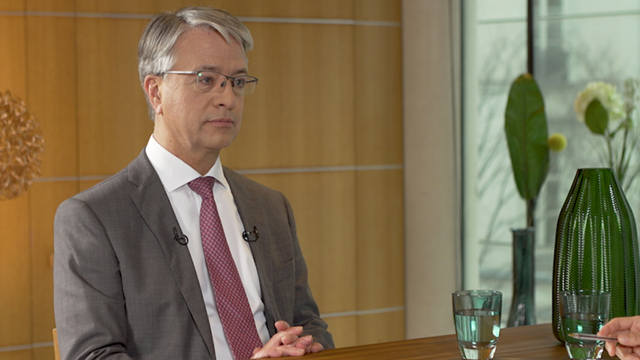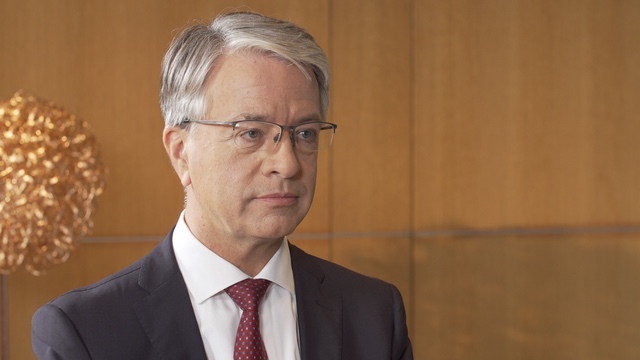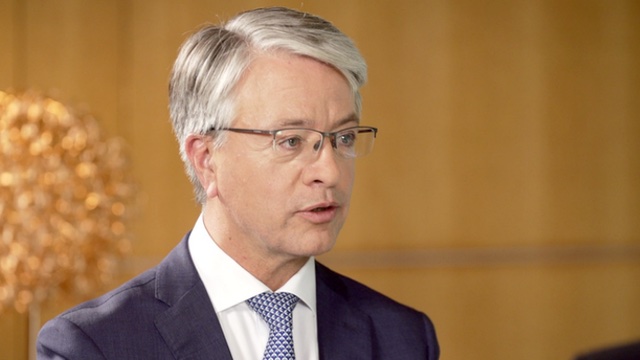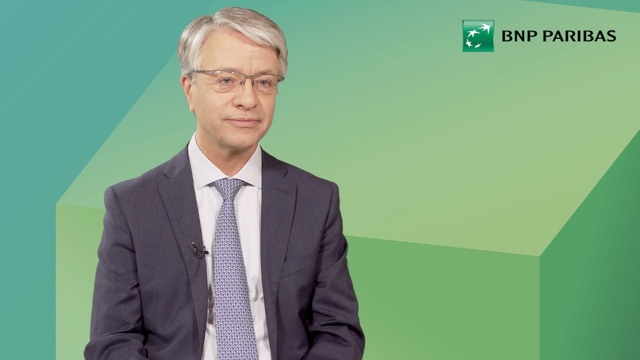EuroBusinessMedia (EBM): BNP Paribas, the euro zone's largest bank, just reported full-year profits for 2006. Baudouin Prot welcome. You are the CEO of BNP Paribas. To begin, briefly, what are your general comments about BNP Paribas' full-year results?
Baudouin Prot (BP): I think the overall comment is that we have had a year of exceptional growth in revenues and profits. The revenues grew 27.9% to 28 billion euros and group net profit grew 25% to 7.3 billion euros. We have to first speak of the organic growth; last year organic growth was really very, very strong with a 13.5% organic growth compared to 10% in 2005. The organic growth has been mainly driven by a performance in corporate investment banking, where we had 7.9 billion euros of revenues, up 22.4% against 2005 with a very strong performance in fixed income, equity derivatives and advisory and also in all of our structured finance activities. So a very strong year in corporate investment banking. We also had, in asset management services, a very comparable organic growth of 22%, and there also from insurance, private banking, all of our asset management and all of our activities in AMS (Asset Management & Services) were very strong last year.
EBM: And what about BNL's contribution to your 2006 full-year earnings?
BP: BNL contributed, for 9 months, 2.3 billion euros of revenues to group revenues. The integration is now very well on track, it gives BNP Paribas a second home market in Europe and we see a very important potential for value creation through revenue and cost synergies according to our plan for the next three years starting in 2007. The geographic breakdown of revenues at BNP Paribas has dramatically changed over the last two years. Compared to 55% of our revenues in France in 2005, in the last quarter of last year it was only 43% of the revenues that came out of France. Now 15% comes from Italy, although altogether Europe makes about 3-quarters of our revenues, and the United States another 15%, and emerging markets 10%. We really like this breakdown and this more balanced revenue origination from Europe for 3-quarters, and US and rest of the world for 25%
EBM: What is your update and progress on your emerging markets business in 2006?
BP: In 2006 we had a strong, rapid increase of our presence in terms of retail banking in emerging markets. Just a figure, at the end of 2005 we had 570 branches in the Mediterranean, Turkey and Ukraine. At the end of 2006 we have 1750 branches, so both a strong organic branch creation programme and acquisitions. Now the revenues of these emerging markets retail banking franchise is 1 billion euro and is going to grow at least 25% in 2007 so these are the main highlights for the group.
EBM: Now that a new chief had been appointed for BNL's corporate business, what is your game plan going forward in Italy? In particular, what kind of corporates are you chasing in Italy: small & medium, or very large companies? What is your current appetite for risk, and how much capital do you plan on allocating to this activity in Italy?
BP: First of all let me say that there is absolutely no change in our strategy due to the replacement of Ricardo Lupi by Robert Ricci. So what is now our strategy in Italy? Our strategy in Italy is very much segmented according to the size and the turnover of our corporate customers in Italy. First, to start with, for the larger customers -- the ones that have over 500 million euros of revenues -- they are now going to be followed by the corporate investment banking team of professionals in Italy. This professional team in Italy has now 225 professionals, they have all of the product set and also all of the coverage organisation to efficiently cross sale to those customers the new, much wider set of products of the BNP Paribas BNL organisation in Italy and we are having a first very good response from these large customers on our product set. I was myself in Milan a few days ago to visit a number of the largest companies and meet with the CEOs and I must say the response to BNP Paribas BNL strategy is very positive. For the smaller size corporations with turnover below 500 million euros, they will be followed by the BNL Banca Commerciale corporate division. Now this division relates on 51 corporate centres across Italy, very much on the mode of the corporate centres we have in France. All of the relationship managers are now trained to know and to become really knowledgeable with the new set of products of BNP Paribas. We have also started joint pitch actions between the BNL team and the professional product teams. There also we believe that from cash management, trade finance, fixed income solutions and also advisory services, we have the full set of products and services to well serve this customer base. We also have now in Bologna in the North Eastern part of Italy, we have a new pilot programme to make this plan even more effective, and we are going to roll out this new framework by the summer. So altogether we see really a good start in the reception and the organisation. In terms of capital we are ready to commit more capital to Italy. Also we are going to keep the kind of rigorous risk approach that you can expect from BNP Paribas, and I think that everything is well set for us to reach the kind of significant revenue synergies that we expect from the very large and extensive corporate customer base of BNL by applying the skills and product set of the full BNP Paribas group.
EBM: Royal Bank of Scotland and ABN Amro, among others, have said that they would like to get out of retail in the US, as they foresee a increase in risks and provisions. What is your plan in the US in 2007 -- status quo, or significant investment?
BP: Regarding our US retail franchise, we have been there for 20 years and we are there to stay. We still believe that behind the challenges of net interest margin and revenue generation that we have recently experienced in the US, the demographics of the western part of the US where we have our footprint located are very strong and we do believe that overall the risk reward of the US Market compares very favourably to both, I would say, Western Europe and emerging markets. Now certainly, the important thing is also regarding the risk situation - BNP Paribas is not exposed to sub-prime mortgage market. The sub-prime mortgage activity is less than 2% of our loan portfolio and we believe that in terms of risk we are much better than the peer group -- we've always had and were going to keep a conservative policy in terms of what kind of loans we originate at Bank West. So what we are really doing now is concentrating on improving the ability to generate organic revenue growth by extending the product set and by having products like insurance, and generating more fee revenues for Bank West, and we are going to consider at a later stage whether we can resume the kind of acquisition strategy. So certainly for the time being we are going to concentrate on the new footprint of Bank West after the successful integration of Community First and Commercial Federal Bank and that will certainly keep us busy for 2007.
EBM: What is your outlook for retail banking in France? In particular, when are margins likely to improve?
BP: Let me first say that the contribution of the French retail branch network to group revenues is now 20%. So you shouldn't overestimate how important it is in terms of group revenues, its only one-fifth of BNP Paribas group revenues as of today. Now regarding the revenue prospect, I think the best is to say that for this year, for 2007, we are committed to producing a revenue growth of 4%, excluding the impact of home saving loans, deposit accounts, the famous PEL-CEL. On top of that, we're committed to having a 1% positive jaw effect between revenue growth and cost growth.
Therefore we should continue to improve gross operating income and I'm still fairly positive on the risk situation and the quality of our loan portfolio - that's the kind of commitments we have taken and we certainly should see, in this 4%, the commission increase continue to be significant, because we believe we are going to continue to have, in financial assets and financial savings, as good a performance in mutual funds and life insurance as we have had in 2006.
EBM: The European Commission in Brussels has been complaining that banks' commissions are too high. How likely is it that you will have to lower your commissions?
BP: In this respect I would really say that BNP Paribas is very well positioned. We have conducted a policy now for years whereby we have increased our fees to the retail customers below inflation every year and there are a lot of comparative studies in France and we see BNP Paribas now positioned right in the middle in terms of fee structure-to-customers. We believe that in this respect we are very well placed, and I don't think that we should expect BNP Paribas to have significant issues in this field for the next few quarters.
EBM: Your capital markets business has benefited from a favourable market environment since 2003. What is your outlook for the market environment in the first-half of 2007 -- should we expect it to be more or less favourable to your capital markets business?
BP: Well certainly the overall market environment for our capital markets activity has been very favourable in 2006, especially in the first half of 2006. I think that BNP Paribas is very well positioned as a true market leader with very strong franchises in derivatives on a worldwide basis, whether for equity derivatives or for interest rate derivatives. And we've seen certainly in 2006 in Europe, but also in America and also increasingly in Asia the relative position of BNP Paribas strengthening. So I would expect us to be able to position ourselves well in markets, certainly going into 2007. The first quarter of last year was exceptionally strong, so this will be a high reference to start with, but overall I think we can remain optimistic about the relative potential of BNP Paribas to take advantage of good market conditions in capital markets activities.
EBM: In asset management, you've been reinforcing your private banking business lately. What are your ambitions in private banking? Should we anticipate moves only in the Euro-zone, or will you be looking at private banking acquisitions in the dollar-zone as well?
Let me first say that regarding the French market, we are the true number 1 player with over 100,000 affluent customers, with over 55 billion euros in assets under management and with over 1500 professionals. We have just acquired Dexia Private Bank France, which will just reinforce our franchise, and there we see continued success if not growing success, so that should continue to grow and this is a very profitable and high growth business. Outside of France in other European countries, we are deploying our private banking model in BNL and I expect this to be a successful example of transferring skills in the new Italian market. The same goes for Spain and in other key European countries we also see some growing success. We have made some mid-size acquisitions certainly in Holland and will continue to make, if we find any, small size acquisitions to complement our footprint in Europe. Outside of Europe we have extensive private banking activity out of Hong Kong and now into Shanghai, into Taiwan in Asia, we have a significant private banking activity in India, and there we could also consider making small to mid-size to complement our activity. So I think overall in private banking, growth will be strong, even by staying only on organic growth it's going to be strong. If we can reinforce it by looking at opportunities for small-sized acquisitions, we are ready to do so.
EBM: It's estimated that you have between 1 and 1,5 billion euros in excess capital. How do you plan to use your excess capital? Could it be used to finance more aggressive development in Italy?
BP: I think if we really look at what happened in terms of our capital management for the last two years we get a very clear picture. First of all, we have increased our dividend and pay out ratio. The pay out ratio for 2006, with 3.1 euro of dividend per share, is going to reach 40%. Apart from paying for the dividend, we have used our cash flow to finance all of our organic growth and all of our medium-sized acquisition. Regarding the BNL acquisition of 9 billion euros, it was financed for 60%, that means 5.4 billion euros, by issuing new shares, but for the remaining 40% we have issued hybrid capital to leverage this acquisition, so I think that was good capital management. As far as the tier one ratio is concerned, we finished last year with a tier one ratio at 7.4%, exactly the same level we had two years ago, and this is the level of tier one ratio with which we are comfortable. We don't want to over pile capital, and certainly at 7.4% we don't do that, and this is the kind of figure that is good for BNP Paribas. So we'll continue to use our free cash flow - apart from paying dividends - to finance organic growth - which is very important for the group and we certainly want to continue organic growth - and mid-sized acquisitions in a disciplined way that I think we've gotten the markets used to.
EBM: What are your plans in Germany, where the market fears that Landesbank Berlin -- the last available target in the German market -- will probably be sold for too high a price?
BP: We certainly are not a candidate for this acquisition. We don't envisage in the near future any acquisitions of the magnitude of BNL. In Germany we are going to continue our organic growth strategy; we see in Germany that Cortal Consors is doing very well. We have really acquired a large number of new customers and we continue to do so. Cetelem also is doing very well in Germany, as we do also in corporate investment banking, so this will be our strategy in Germany for the time being.
EBM: Baudoin Prot, CEO of BNP Paribas, thank you very much
BP: Thank you






